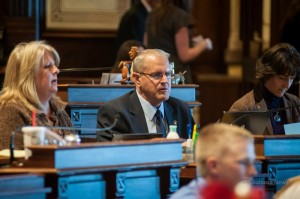Is it time for significant education reform?
Government is properly committed to assuring that all children receive a minimum education. It currently does so by setting up and running schools, assigning students to a school district, and funding education for those who attend the government schools. Students either go to their designated schools or else they do not benefit from the government commitment to education. The only exception in Iowa is that for several years “open enrollment” has allowed a very limited choice to parents to have their children attend a different public school.Many Iowans believe we have lost our way on our fundamental approach to providing education for our children. For many years our “top down” system that gives the state, through the Department of Education, a very heavy-handed influence over local schools, school boards, parents and teachers. Twenty years ago Iowa spent 37% of the General Fund revenue for K – 12 education, and we consistently ranked at or near the top of the states in education performance. Now we spend 43% of General Fund revenue for K – 12 education, and we are very average in a nation that’s very average in education performance. Some of that may be due to demographic changes, but it’s hard to argue that that we have an excellent education system in Iowa that can’t be improved.
Recently a bill was introduced in the Iowa Senate that would fundamentally change our approach to providing education in Iowa. The focus and intent of this legislation was to return the control of education to local school boards and parents. This legislation would abolish the state department of education and transfer the authority and duties of the department of education to the area education agencies and community colleges. It would also establish an education savings grant program and fund. The ESA would effectively grant funding for pupils attending a nonpublic school so that parents who choose parochial, private or home-schooling alternatives are on a level playing field with those who choose public education. This legislation died in sub-committee Thursday morning, but it highlighted the need for a broad discussion on how we might improve the education we’re providing for our children going forward. I would welcome any thoughts you have regarding this issue.
Sustainable Coverage for Iowa’s Uninsured
Governor Terry Branstad unveiled a healthcare plan providing medical coverage for uninsured Iowans while enabling them to take ownership of their healthcare and wellbeing. The Healthy Iowa Plan would cover all of the approximately 89,000 uninsured Iowans earning below 100% federal poverty level without depending upon Medicaid or the federal government for full funding.
This program provides outcome-based solutions for Iowans, allowing them to take ownership of their health by providing incentives for healthy behavior. Much like private insurance, Iowans will pay reduced costs when they take preventative measures to protect their health. Additionally, local hospitals will participate in the Healthy Iowan Plan, giving Iowans freedom to see their family doctor of choice.
The Healthy Iowa Plan provides much-needed coverage for eligible Iowans in a responsible and sustainable manner. Iowans will be able to make informed choices about their healthcare without our state being beholden to the federal government and unreliable funding sources. Iowans deserve affordable health care without the looming threat of additional tax burdens, or the uncertainty of the federal government keeping their promises.
Property Tax Reform Is Critical
Property taxes are out of control in Iowa and Senate Republicans recognize the need to enact immediate change. High property tax rates discourage business and job growth statewide, with some rural community commercial property owners resorting to demolishing functional vacant buildings rather than continue to pay overly-exorbitant tax rates that eat away at a profit. Property tax reform is critical to the economic health of our state and our ability to compete in the global economy.
Unfortunately for Iowans, Senate Democrats are offering a paper tiger of a property tax bill that will provide no measurable relief to property tax payers. Their bill offers property tax credits funded at $50 million in the first year and then relies on the state jumping revenue hurdles to grow to a maximum level of $250 million in tax credit. The Democrat plan is an unwise investment for the state because it will do nothing to truly alleviate the property tax burden on hardworking Iowans or attract business.
Governor Branstad has proposed a property tax reform plan that would provide meaningful change across all classes of property in Iowa. The $400 million plan aims at reducing commercial, industrial, and railroad property taxes. It also limits annual increases and controls future growth rates on all classes of property. The Governor’s plan is a sound long-term plan that will benefit all Iowans and bolster the health of our economy.
The time is right for meaningful property tax reform across all classes of property. Our state cannot afford a weak attempt at providing relief that is short-term and dependent upon future revenue gymnastics. We must give Iowans true, long-term property tax reform so they have the confidence to grow their businesses.
Please continue to stay informed and active in your state legislature.
Senator Ken Rozenboom











